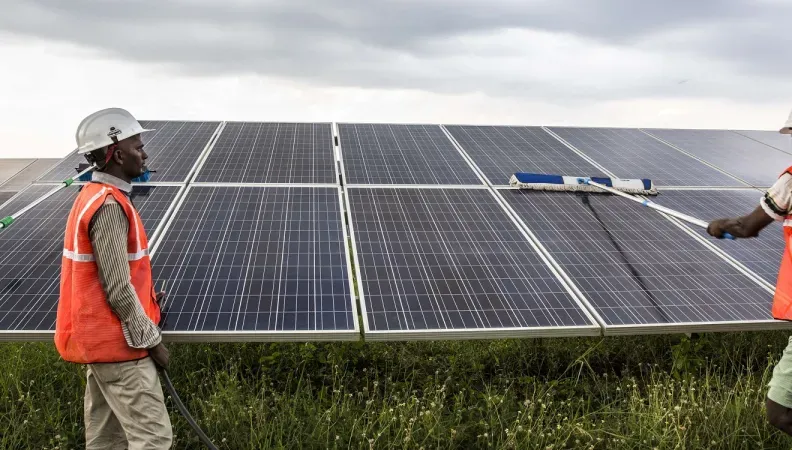Share the page
How to reduce greenhouse gas emissions without reducing growth? AFD has solutions

The 30th Conference of the Parties on Climate Change (COP30), taking place in Belém, Brazil, from November 10 to 21, 2025, is a fresh opportunity for countries to step up their climate commitments. Especially because reducing greenhouse gas emissions does not mean giving up on economic growth. In fact, it’s quite the opposite!
It’s a common misconception that still remains prevalent across the globe: reducing greenhouse gas emissions would comprise the economic growth of countries and work against progress in societies. “It’s an urban myth!” says Atika Ben Maïd, Deputy Director of the Climate and Nature Division at Agence Française de Développement (AFD). “For example, if you take the case of the Paris Agreement, it’s not about promoting any form of backtracking. It’s all about low-carbon and resilient development paths. Otherwise, it would have meant signing off on a failure, with no overall commitment.”
Adrien Vogt-Schilb, an AFD economist, goes even further: “Climate change mitigation through the reduction of greenhouse gas emissions offers an economic opportunity. It’s not a sacrifice we’re asking developing countries to make, while they aren’t even the historical polluters. For example, the last study I was involved in on this issue evaluated the benefit of carbon neutrality for Latin America at $3 trillion.”
Further reading: Climate Change : Promoting and Supporting Citizen Engagement
AFD has made the fight against climate change a priority. It takes action to support mitigation solutions that also improve the well-being of people and the economic situation in the countries where it operates. AFD has the following solutions:
Focus on Agroecology
“The first driver for low-carbon growth is to increase crop yields, because producing more food on the same plot reduces the need for land, meaning there is less destruction of ecosystems and a lower level of CO2 emissions. It also increases incomes and food security,” says Adrien Vogt-Schilb.
Agroecology is today essential to the achievement of this objective, while only using synthetic inputs, which threaten biodiversity, when they are necessary. This agricultural technique places nature at the center of a virtuous production system: diversifying compatible and complementary crops on the same plot better serves the needs of everyone, while benefiting biodiversity, which is itself invaluable in disease and pest control. It also improves the renewal of natural resources.
To strengthen its support to agroecological transitions, in 2023, AFD adopted a position paper on the issue. In the same year, the ongoing or completed projects financed by AFD assisted 631,000 family farms, covering a total of 51,400 hectares of land, with their conversion to agroecological systems.
Further reading: 5 Agroecology Projects, to Improve Food Security and Protect the Environment
Promote Greener Mobility
Buses, metros, tramways, trains, cable cars, river shuttles, bicycles… There are a vast array of solutions for reducing greenhouse gas emissions in our transport. And their deployment also provides many other benefits: a reduction in travel costs, air pollution, traffic congestion and accidents, health gains from physical activity, and a lower impact on ecosystems and the services they provide. “Every item on this list can easily represent a gain of 1 to 3 GDP points in most countries of the world,” says Adrien Vogt-Schilb.
AFD’s objective is to promote the development of livable and inclusive cities by investing in efficient public transport systems. It also promotes “active modes” (cycling and walking) and better interconnection between the various modes of transport, as well as an efficient management of road traffic, which needs to go electric.
Between 2021 and 2023, 22 transport facilities financed by AFD were either commissioned or completed. This has improved access to sustainable transport for 6.4 million people.
In Turkey, through a €200 million loan combined with a €15 million grant from the European Union, AFD is helping ILBANK, the bank for municipalities, finance urban transport infrastructure in ten cities. It is also providing grants for preparing or updating Sustainable Urban Mobility Plans (SUMPs) and studies on the innovative aspects of mobility (electric and smart mobility).
Develop Renewable Energies
Solar, wind, hydropower: there are almost no greenhouse gas emissions with the use of these energy sources, and they can now provide cheap electricity. So, they are a perfect solution for replacing fossil fuels wherever possible. “These technologies have already won. A solar photovoltaic power plant produces electricity that can support economic activity with a much lower carbon footprint,” says Adrien Vogt-Schilb.
AFD is currently supporting 52 renewable energy infrastructure projects in Africa, Asia, and South America. In 2023, the projects financed and completed have created a renewable power generation capacity of 3,000 MW and provided 203,400 people with access to sustainable electricity services.
Further reading: €300 Million for a Just Energy Transition in South Africa
The Group has also launched several just energy transition programs (JETP) in partnership with local stakeholders, including governments, public and private enterprises, financial institutions, non-governmental organizations (NGOs), and civil society. It is mobilizing its entire range of financial tools for this, with three focuses: support the deployment of proactive and protective public policies, promote inclusive planning and governance, and help create decent jobs and support households and regions.
“Over the last five years, AFD has supported more than 40 energy transition projects that include a specific objective on the issue of equity. For example, we’re working in South Africa, Vietnam, Indonesia and Senegal through JETPs (Just Energy Transition Partnerships). It’s a new way of mobilizing climate finance ‘at scale’ for the energy transition, with social justice a core priority,” says Nicolas Guichard, Head of the Energy Division at AFD.
